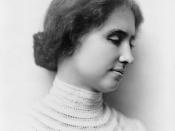"To Helen"� and "Helen"� by Edgar Allen Poe and H.D respectively both discuss the same woman yet contain vastly contrasting views of her. In both poems Helen of troy is the subject. In "Helen"� the speaker believes Helen is the embodiment of all Greece hates while in "To Helen"� the speaker believes Helen is the embodiment of all Greece loves and represents.
The tone of "To Helen"� can be guessed by it's title. The use of apostrophe suggests the speaker respects and feels close to Helen. This intern implies a favorable view of Helen. Indeed the speaker not only displays respect throughout the poem but also adoration. In lines tree the speaker uses simile to compare Helen's beauty to a ship on a "perfumed sea"� For the speaker the thought of Helen's beauty is like a ship taking a "weary, way worn wanderer"� home.
It transports him to "the glory that was Greece and the grandeur that was Rome."� The tone of "Helen"� can also be guessed by it's title. The use of her name, Helen, shows less respect and intern implies a less favorable view of Helen. Indeed the speaker not only displays disrespect throughout the poem but also hate. Unlike the speaker of "To Helen"� The speaker of "Helen"� does not celebrate Helen's beauty. She believe it is tainted because of the character of the woman who posses it. Because of Helen's "past enchantments and past ills"� the speaker believes Greece can only love her "if she were laid, white ash amid funeral cypresses."� Contrastingly the speaker of "To Helen"� imagines Helen alive in his window holding an agate lamp. For him Helen is the embodiment of all Greece love in contrast to the speaker in "Helen"� who believe Helen embodies everything Greece hates.
In stanza two the speaker of "to Helen"� uses descriptive language to express his adoration for Helen. Describing Helen with diction like "hyacinth hair"�, "classic face"� and "Naiad airs."� The speaker of "Helen"� also uses descriptive language to express her hate for Helen. Describing Helen with diction "wan face"�, "past enchantments"� and "past ills."� In the third and last stanza of "To Helen"� the speaker imagines Helen is standing by his window with a lamp in her hand. In the third and also last stanza of "Helen the speaker wishes Helen were dead.





